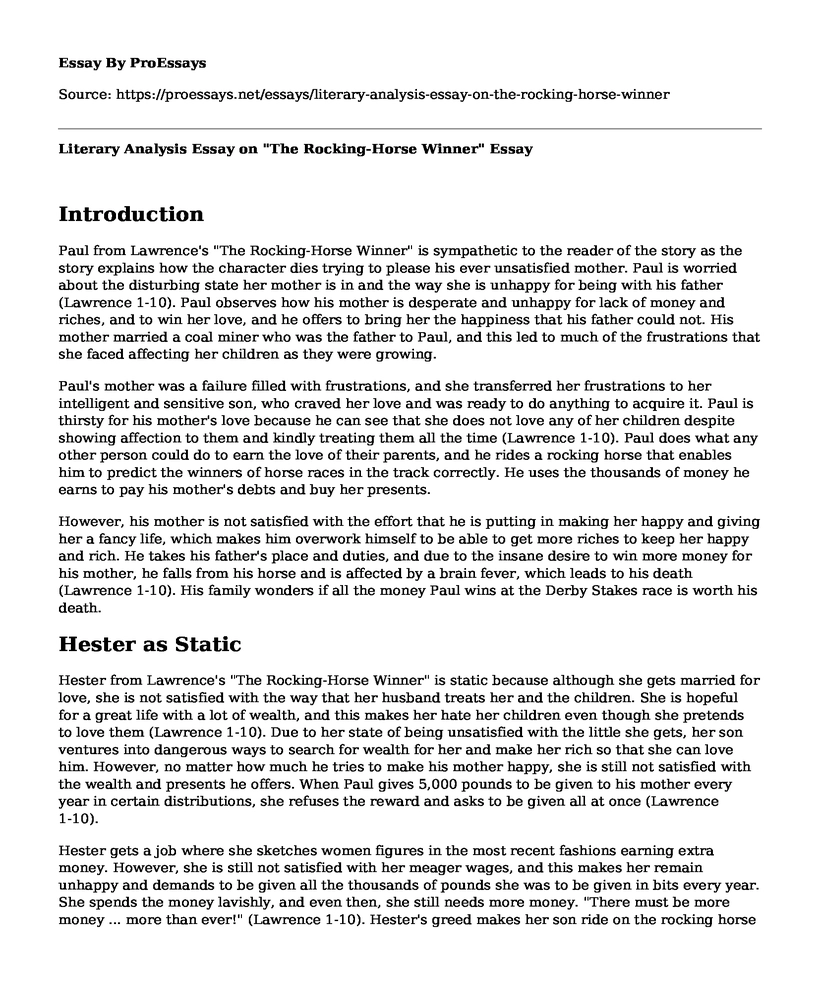Introduction
Paul from Lawrence's "The Rocking-Horse Winner" is sympathetic to the reader of the story as the story explains how the character dies trying to please his ever unsatisfied mother. Paul is worried about the disturbing state her mother is in and the way she is unhappy for being with his father (Lawrence 1-10). Paul observes how his mother is desperate and unhappy for lack of money and riches, and to win her love, and he offers to bring her the happiness that his father could not. His mother married a coal miner who was the father to Paul, and this led to much of the frustrations that she faced affecting her children as they were growing.
Paul's mother was a failure filled with frustrations, and she transferred her frustrations to her intelligent and sensitive son, who craved her love and was ready to do anything to acquire it. Paul is thirsty for his mother's love because he can see that she does not love any of her children despite showing affection to them and kindly treating them all the time (Lawrence 1-10). Paul does what any other person could do to earn the love of their parents, and he rides a rocking horse that enables him to predict the winners of horse races in the track correctly. He uses the thousands of money he earns to pay his mother's debts and buy her presents.
However, his mother is not satisfied with the effort that he is putting in making her happy and giving her a fancy life, which makes him overwork himself to be able to get more riches to keep her happy and rich. He takes his father's place and duties, and due to the insane desire to win more money for his mother, he falls from his horse and is affected by a brain fever, which leads to his death (Lawrence 1-10). His family wonders if all the money Paul wins at the Derby Stakes race is worth his death.
Hester as Static
Hester from Lawrence's "The Rocking-Horse Winner" is static because although she gets married for love, she is not satisfied with the way that her husband treats her and the children. She is hopeful for a great life with a lot of wealth, and this makes her hate her children even though she pretends to love them (Lawrence 1-10). Due to her state of being unsatisfied with the little she gets, her son ventures into dangerous ways to search for wealth for her and make her rich so that she can love him. However, no matter how much he tries to make his mother happy, she is still not satisfied with the wealth and presents he offers. When Paul gives 5,000 pounds to be given to his mother every year in certain distributions, she refuses the reward and asks to be given all at once (Lawrence 1-10).
Hester gets a job where she sketches women figures in the most recent fashions earning extra money. However, she is still not satisfied with her meager wages, and this makes her remain unhappy and demands to be given all the thousands of pounds she was to be given in bits every year. She spends the money lavishly, and even then, she still needs more money. "There must be more money ... more than ever!" (Lawrence 1-10). Hester's greed makes her son ride on the rocking horse vigorously in search of the winner, and he falls, gets a brain tumor, and dies some days later. Hester's greed for money and wealth costs her the death of her son, who changed her life from poverty to riches.
Works Cited
Lawrence, D.H. "The Rocking-Horse Winner--D. H. Lawrence (1885-1930)." Classic Short Stories, 1966, www.classicshorts.com/stories/rockwinr.html.
Cite this page
Literary Analysis Essay on "The Rocking-Horse Winner". (2023, Apr 01). Retrieved from https://proessays.net/essays/literary-analysis-essay-on-the-rocking-horse-winner
If you are the original author of this essay and no longer wish to have it published on the ProEssays website, please click below to request its removal:
- Stopping by Woods on a Snowy Evening: Poem Analysis
- Compare and Contrast Essay on The Great Gatsby Novel and Movie
- A Temple of the Holy Ghost by Flannery O'Connor - Critical Essay
- Dreams Postponed: A Reflection on Harlem Life
- Literary Analysis Essay on Pride and Prejudice: Does Mr and Mrs Bennet Good Parents?
- Essay Example on Sherlock Holmes & Dr. Watson: Solving Mysteries Together
- Literary Analysis Essay on Dover Beach







